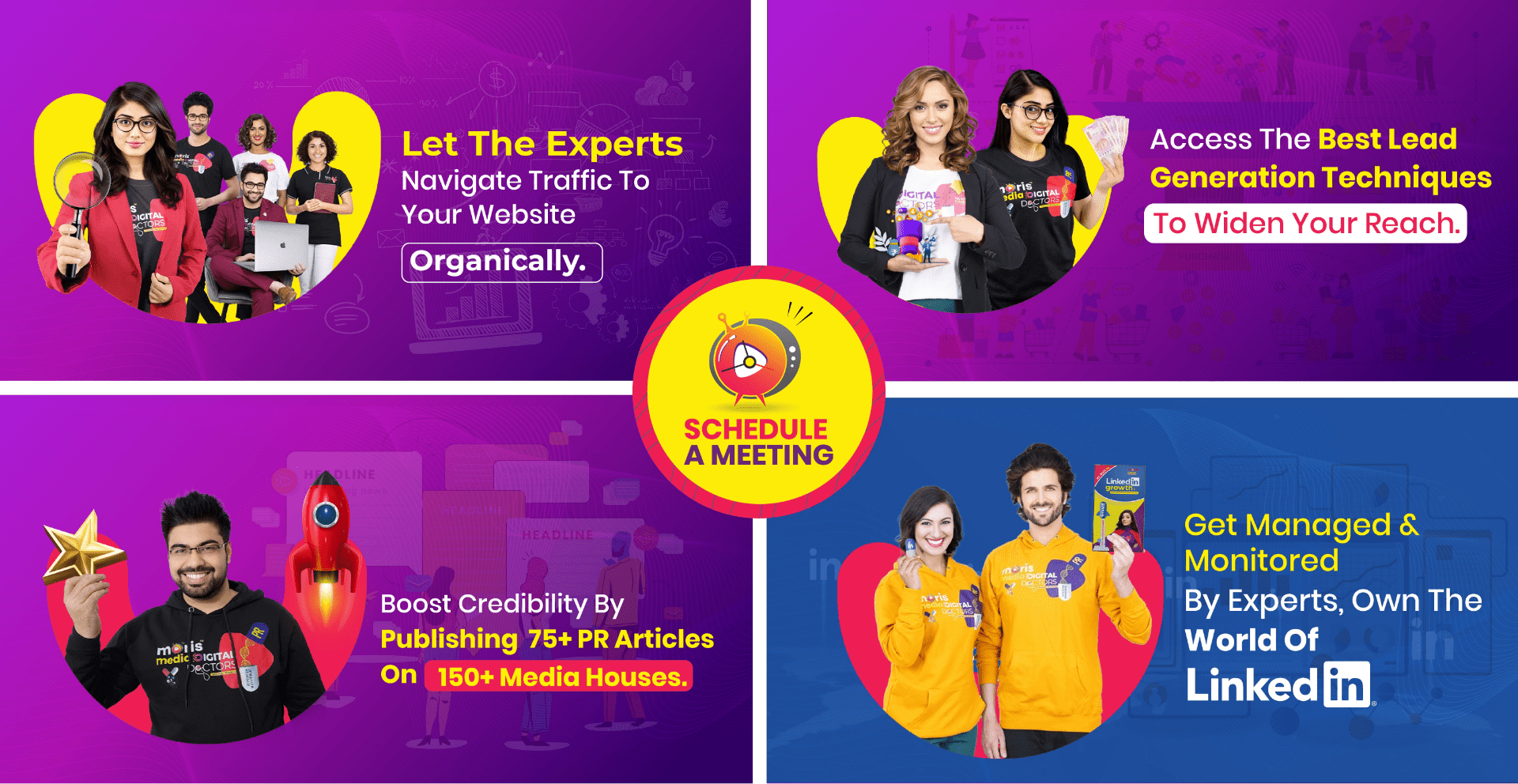Frequently Asked Questions
Emerging trends in celebrity management reflect the evolving dynamics of the entertainment industry and changing consumer preferences. Moris Media presents some key trends to note:
Digital and Social Media Influence: The rise of digital platforms and social media has significantly impacted celebrity management. Celebrity managers are increasingly focusing on leveraging digital channels to build and engage with fan communities, create personalized content, and develop direct connections with audiences. The ability to harness social media platforms effectively has become essential for celebrity success and brand building.
Diversification of Revenue Streams: Celebrity managers are exploring diverse revenue streams beyond traditional avenues such as films or music. This includes expanding into areas like brand partnerships, endorsements, merchandise lines, social media monetization, and entrepreneurial ventures. Managers are actively seeking opportunities for their clients to maximize their earning potential and create long-term financial stability.
Influencer Collaborations: Collaborations between traditional celebrities and digital influencers are gaining popularity. Celebrity managers are recognizing the power of influencer marketing and partnering with popular social media influencers to amplify their clients' reach, engage with younger demographics, and tap into niche audiences. These collaborations bridge the gap between traditional and digital media, creating unique promotional opportunities.
Authenticity and Personal Branding: The demand for authentic and relatable content is driving the importance of personal branding. Celebrity managers are helping their clients craft and maintain an authentic personal brand that aligns with their values, interests, and unique qualities. This involves showcasing their clients' passions, philanthropic efforts, and behind-the-scenes glimpses, fostering a deeper connection with fans.
Cause-Related Marketing: Celebrities are increasingly using their influence to advocate for social causes and support philanthropic initiatives. Celebrity managers play a vital role in identifying and aligning their clients with meaningful causes, managing partnerships with non-profit organizations, and leveraging their clients' platforms to raise awareness and make a positive impact. Cause-related marketing helps celebrities connect with socially conscious audiences and enhance their public image.
Data-Driven Decision Making: Celebrity managers are leveraging data analytics and market insights to make informed decisions. They analyse audience demographics, consumer behavior, social media metrics, and market trends to identify opportunities, optimize content strategies, and measure the effectiveness of campaigns. Data-driven decision making enables managers to tailor strategies, secure relevant brand partnerships, and create targeted content.
Global Expansion: With the globalization of entertainment, celebrity managers are focusing on expanding their clients' reach beyond national borders. They identify opportunities for international collaborations, explore cross-cultural ventures, and facilitate strategic partnerships to help their clients gain global recognition and access new markets.
Mental Health and Wellness Support: Recognizing the importance of mental health and well-being, celebrity managers are increasingly prioritizing the emotional and psychological support of their clients. They help facilitate access to mental health professionals, implement self-care practices, and promote work-life balance to ensure the overall well-being of their clients.
Handling crisis communication and damage control is a critical aspect of a celebrity manager's role. Here are some key steps that celebrity managers at Moris Media typically follow to effectively manage crises and protect their clients' reputations:
Rapid Response: Celebrity managers aim to respond quickly and proactively to any crisis situation. They gather accurate information, assess the severity of the situation, and formulate a strategic response plan.
Assessing the Impact: Managers evaluate the potential impact of the crisis on the client's reputation, career, and public image. They consider various factors such as the nature of the crisis, media coverage, public sentiment, and stakeholder reactions.
Developing a Crisis Communication Plan: Managers work with PR professionals to develop a comprehensive crisis communication plan. This includes identifying key messages, determining the appropriate channels of communication, and preparing spokespersons to address the media and public.
Transparent and Authentic Communication: Managers prioritize transparent and authentic communication during a crisis. They ensure that accurate information is shared promptly and effectively, maintaining open lines of communication with the media, stakeholders, and the public. Authenticity and transparency help mitigate rumours, speculation, and potential damage to the client's reputation.
Media Relations Management: Managers engage with the media to manage the narrative and provide accurate information. They may issue press releases, schedule interviews, or arrange press conferences to address the crisis. Managers provide media training to their clients to ensure they effectively communicate their side of the story while maintaining composure and empathy.
Social Media Monitoring and Engagement: Celebrity managers closely monitor social media platforms to track conversations, sentiment, and public reactions during a crisis. They proactively engage with followers, addressing concerns, clarifying misinformation, and providing updates. Social media engagement helps manage the narrative and maintain control over the client's public image.
Stakeholder Management: Managers communicate with key stakeholders, including agents, publicists, legal advisors, and brand partners, to ensure they are informed and aligned with the crisis communication strategy. They work closely with stakeholders to manage potential fallout, protect the client's interests, and maintain important relationships.
Legal Considerations: Managers consult with legal advisors to understand the legal implications of the crisis and ensure compliance with relevant laws. They seek guidance on defamation, privacy, and other legal issues, protecting the client's rights throughout the crisis management process.
Rebuilding Trust and Reputation: Managers develop strategies to rebuild trust and restore the client's reputation post-crisis. This may involve public apologies, sincere gestures of goodwill, active engagement in community initiatives, or partnerships with credible organizations aligned with the client's values.
Learning and Growth: After the crisis is resolved, managers conduct a thorough evaluation of the situation. They identify lessons learned, assess the effectiveness of the crisis management plan, and implement any necessary changes or improvements for future crisis situations.
Celebrity managers at Moris Media employ various strategies for talent development to nurture their clients' careers and help them reach their full potential.
Identifying Strengths and Areas for Growth: Managers assess their clients' strengths, talents, and areas for improvement. They identify the unique qualities that set their clients apart and develop a deep understanding of their skills, aspirations, and career goals.
Career Planning and Goal Setting: Managers work closely with their clients to establish long-term career goals and develop strategic plans to achieve them. They create a roadmap for success, setting milestones and targets along the way. This includes identifying desired roles, genres, and industries to guide career trajectory.
Guidance and Mentorship: Managers provide guidance and mentorship to their clients throughout their careers. They offer advice, share industry insights, and provide constructive feedback to help their clients improve their craft, expand their skills, and make informed decisions.
Networking and Relationship Building: Managers leverage their industry networks to create opportunities for their clients. They connect their clients with influential professionals, agents, casting directors, and producers who can further their careers. Building and nurturing relationships within the industry is essential for talent development.
Professional Development Opportunities: Managers seek professional development opportunities for their clients, including workshops, training programs, and educational resources. They encourage their clients to enhance their skills, broaden their knowledge, and stay updated on industry trends and advancements.
Strategic Project Selection: Managers guide their clients in selecting projects that align with their career goals and showcase their talents effectively. They help assess script offers, evaluate casting choices, and determine the potential impact of a project on the client's career trajectory. Strategic project selection is crucial for talent development and maintaining a strong professional portfolio.
Branding and Image Management: Managers assist in crafting and managing their clients' personal brand and public image. They ensure consistency in messaging, positioning, and visual representation. They guide their clients in making choices that align with their brand identity and support their long-term career goals.
Continuous Promotion and Publicity: Managers actively promote their clients' work, talents, and achievements to maintain visibility and generate buzz. They collaborate with PR teams to secure media coverage, arrange interviews, and coordinate promotional activities. Effective publicity helps raise the client's profile and create opportunities for further talent development.
Collaboration and Cross-Industry Ventures: Managers explore collaboration opportunities and cross-industry ventures to expand their clients' reach and showcase their talents to new audiences. This may involve exploring projects in different mediums, such as film, television, music, theatre, or digital platforms, to diversify their clients' portfolios and unlock new creative possibilities.
Emotional and Personal Support: Talent development also includes providing emotional support to clients. Managers recognize the challenges and pressures that come with a career in the entertainment industry and offer a support system for their clients. They prioritize their clients' well-being, encourage work-life balance, and provide guidance during personal and professional transitions.
Handling contract breaches and legal disputes is a challenging aspect of celebrity management. Here are the general steps that celebrity managers at Moris Media typically follow in such situations:
Assess the Situation: When a contract breach or legal dispute arises, managers gather all relevant information and documentation related to the contract or agreement in question. They assess the nature and extent of the breach or dispute to understand the implications and potential consequences.
Engage Legal Counsel: Managers work closely with experienced entertainment lawyers or legal advisors specializing in contract law. They seek legal advice to understand their options, rights, and the best course of action to resolve the dispute or address the breach. Legal professionals provide guidance on the legal aspects, potential remedies, and available courses of action.
Open Communication: Managers initiate open and constructive communication with the other party involved in the contract breach or dispute. They aim to resolve the issue amicably and efficiently, avoiding unnecessary escalation. Managers may engage in direct negotiations, mediated discussions, or utilize dispute resolution mechanisms specified in the contract, such as arbitration or mediation.
Contractual Remedies: Managers evaluate the contractual remedies available in the event of a breach. They review the contract terms, including termination clauses, liquidated damages provisions, or specific remedies outlined in case of breaches. Managers work with legal counsel to determine the most appropriate course of action based on the contract's terms and the client's best interests.
Damage Control: Managers focus on minimizing any potential damage to the client's reputation or career resulting from the breach or legal dispute. They strategize with legal advisors and PR teams to determine the best approach for managing public perception, issuing statements, or handling media inquiries. The goal is to protect the client's image while resolving the dispute or breach.
Negotiations and Settlement: Managers engage in negotiations with the other party to reach a mutually agreeable resolution. This may involve discussions regarding financial compensation, revised contract terms, corrective actions, or alternative arrangements to address the breach or dispute. Managers work closely with legal advisors to ensure that any settlement reached protects the client's interests and rights.
Legal Action if Necessary: In some cases, legal action may be required to resolve a contract breach or legal dispute. Managers, in consultation with legal counsel, may decide to file a lawsuit, pursue arbitration, or take other legal measures to seek redress for their client. They coordinate closely with legal professionals to navigate the legal process and protect the client's rights throughout.
Documentation and Record-Keeping: Managers maintain detailed records of all communication, contractual agreements, and relevant documentation related to the breach or dispute. These records serve as evidence if legal action becomes necessary and help ensure the client's interests are protected.
Review and Learning: After the resolution of the contract breach or legal dispute, managers conduct a thorough review of the situation. They assess what went wrong, identify any areas for improvement, and implement measures to mitigate similar risks in the future. This includes reviewing contracts, improving risk assessment processes, or updating contractual terms to better protect the client's interests.
Managing a celebrity's digital presence is crucial in today's digital age. Moris Media suggests key considerations for celebrity managers when it comes to managing their clients' digital presence:
Brand Alignment: Celebrity managers ensure that their clients' digital presence aligns with their personal brand. They establish consistent messaging, visuals, and tone of voice across various digital platforms to reinforce the client's brand identity and image.
Social Media Strategy: Managers develop a strategic social media strategy for their clients. They determine the appropriate platforms to focus on based on the target audience and the client's brand. They plan content calendars, engage with followers, and leverage social media features effectively to maximize engagement and reach.
Online Reputation Management: Managers monitor and manage their clients' online reputation. They proactively address negative comments or feedback, address rumours or misinformation, and ensure that the client's digital presence reflects their desired image. They work closely with PR teams to manage any potential crises or reputation-related issues.
Content Creation and Curation: Managers oversee the creation and curation of digital content for their clients. They collaborate with content creators, photographers, videographers, and graphic designers to develop compelling visuals, videos, and written content that resonates with the target audience and supports the client's brand.
Audience Engagement: Managers prioritize audience engagement on digital platforms. They respond to comments, messages, and inquiries, creating a sense of connection and fostering relationships with fans and followers. They encourage meaningful interactions, implement contests or giveaways, and leverage user-generated content to enhance engagement.
Digital Partnerships and Collaborations: Managers explore digital partnership opportunities for their clients. This includes collaborations with other influencers, brands, or platforms to expand the client's reach, gain exposure to new audiences, and create mutually beneficial relationships.
Data Analytics and Insights: Managers utilize data analytics tools to gain insights into the performance of their clients' digital presence. They analyse engagement metrics, follower demographics, and content effectiveness to refine the digital strategy, optimize content, and make data-driven decisions.
Privacy and Security: Managers prioritize the privacy and security of their clients' digital presence. They implement measures to protect personal information, prevent unauthorized access, and manage data privacy according to applicable regulations. They educate their clients about best practices and potential risks related to privacy and online security.
Influencer and Celebrity Collaborations: Managers consider opportunities for their clients to collaborate with other influencers or celebrities in digital campaigns or content collaborations. These collaborations can help expand the client's reach, tap into new audiences, and generate buzz and engagement.
Keeping Up with Digital Trends: Managers stay informed about digital trends, emerging platforms, and evolving consumer behaviours. They adapt their digital strategies to leverage new opportunities and stay relevant in the ever-changing digital landscape.
Celebrity managers play a crucial role in managing the careers of their clients, including handling the transition from one project to another. Here are some common strategies and practices that celebrity managers at Moris Media use during such transitions:
Strategic Planning: Managers work closely with their clients to create a long-term career plan. They consider factors such as the client's goals, market trends, industry contacts, and audience preferences. By having a clear plan in place, managers can smoothly navigate transitions between projects.
Project Evaluation: Managers assess potential projects based on their alignment with the client's career trajectory, brand image, and financial viability. They consider various aspects, including the script, production team, co-stars, budget, and potential impact on the client's career. This evaluation helps managers guide their clients in making informed decisions.
Networking and Relationship Building: Managers leverage their industry contacts and relationships to identify new project opportunities. They actively network with casting directors, producers, directors, and other industry professionals to stay updated on upcoming projects and secure their clients' involvement in suitable ventures.
Negotiations: Celebrity managers negotiate on behalf of their clients for favorable terms and conditions, including contracts, compensation, creative control, and scheduling. They aim to secure the best possible opportunities for their clients while ensuring that their interests are protected during the transition from one project to another.
Public Relations: Managers work with publicists and PR teams to manage the client's public image during project transitions. They coordinate media appearances, interviews, and press releases to generate positive publicity and maintain the client's visibility and relevance in the industry.
Scheduling and Time Management: Managers oversee the client's schedule to ensure a smooth transition between projects. They coordinate filming dates, promotional activities, and other commitments to avoid conflicts and maximize the client's availability for new projects.
Branding and Marketing: Managers play a pivotal role in shaping and maintaining their clients' brand image. They strategize marketing campaigns and promotional activities to leverage the client's existing fan base and attract new audiences during project transitions.
Career Diversification: Managers may advise their clients on diversifying their career portfolio by exploring different genres, mediums, or markets. This approach helps celebrities expand their reach and mitigate the risks associated with being too closely associated with a single project or character.
Continuous Industry Monitoring: Managers stay updated on industry trends, emerging platforms, and new opportunities. They actively seek out potential projects that align with their clients' career goals and adapt their strategies accordingly to ensure successful transitions.
The role of a talent agent in celebrity management is to represent and advocate for their clients within the entertainment industry. Talent agents serve as intermediaries between celebrities and industry professionals, working to secure opportunities and negotiate contracts on behalf of their clients. Moris Media highlights some key responsibilities and functions of talent agents:
Career Representation: Talent agents serve as the primary representatives of their clients' professional interests. They work closely with celebrities to understand their career goals, preferences, and aspirations. Agents then use this information to identify suitable opportunities that align with their clients' interests and negotiate contracts for projects such as films, television shows, endorsements, brand partnerships, and live performances.
Industry Networking: Talent agents maintain extensive networks of industry professionals, including casting directors, producers, directors, executives, and other agents. They leverage these connections to pitch their clients for various projects, secure auditions, and create opportunities for career advancement.
Opportunity Sourcing: Talent agents actively seek out new and promising opportunities for their clients. They stay informed about industry trends, upcoming projects, and casting calls. By staying abreast of industry developments, agents can identify potential roles or projects that may be suitable for their clients, and they initiate the submission process or negotiate deals accordingly.
Contract Negotiation: Agents negotiate on behalf of their clients to secure favourable terms and conditions for their engagements. This includes aspects such as compensation, intellectual property rights, creative control, scheduling, and promotional commitments. They aim to protect their clients' interests while ensuring that the terms are mutually beneficial for both the celebrity and the production entity.
Career Strategy and Planning: Talent agents work closely with their clients to develop long-term career strategies. They provide guidance on project selection, career diversification, brand building, and market positioning. Agents help their clients make informed decisions that align with their overall career objectives and aspirations.
Marketing and Branding: Talent agents collaborate with their clients and their clients' publicists to develop marketing and branding strategies. They assist in shaping the public image of their clients, managing their online presence, coordinating media appearances, and leveraging social media platforms to enhance their visibility and relevance.
Industry Trends and Insights: Talent agents stay updated on industry trends, emerging platforms, and audience preferences. They provide insights and advice to their clients regarding potential career opportunities, areas of growth, and strategies for staying relevant in a dynamic entertainment landscape.
Contract and Legal Support: Talent agents work closely with entertainment lawyers and legal teams to ensure that contracts and agreements are legally sound and protect their clients' rights. They review contracts, address any concerns, and collaborate with legal professionals to negotiate terms that are advantageous to their clients.
Professional Development: Talent agents assist in identifying opportunities for their clients' professional growth and development. This includes arranging workshops, training programs, or mentorship opportunities that can enhance their skills and expand their repertoire.
Celebrity managers at Moris Media play a crucial role in career planning and strategizing for their clients. They work closely with celebrities to create a roadmap for their careers, taking into account their goals, aspirations, strengths, and industry trends.
Goal Identification: Celebrity managers initiate the process by conducting thorough discussions with their clients to understand their long-term goals and aspirations. This involves exploring their desired career trajectory, the types of projects they want to pursue, and any specific milestones they aim to achieve.
SWOT Analysis: Managers conduct a SWOT (Strengths, Weaknesses, Opportunities, Threats) analysis to assess their clients' current position in the industry. They evaluate their clients' talents, skills, unique selling points, and areas where they can improve. This analysis helps in identifying the competitive advantage of their clients and potential challenges they may face.
Market Research: Managers stay abreast of industry trends, audience preferences, and emerging opportunities. They research market dynamics, analysing successful projects and identifying potential avenues for their clients to explore. By understanding the industry landscape, managers can provide informed guidance for their clients' career planning.
Project Selection: Based on the client's goals and the market research, managers help in selecting the right projects that align with their clients' career objectives. They consider factors such as script quality, production team, co-stars, genre, target audience, and potential impact on the client's career. Managers aim to curate a diverse portfolio of projects that showcase the client's range and appeal to their target audience.
Branding and Image Management: Celebrity managers work on developing and maintaining their clients' brand image. They help shape the client's public persona, defining their unique selling points and positioning within the industry. Managers collaborate with publicists and marketing teams to craft a cohesive brand strategy that reflects the client's values, talents, and aspirations.
Long-Term Planning: Managers assist in creating a long-term career plan that outlines the desired trajectory over several years. This plan takes into account the client's goals, potential growth opportunities, and strategies to navigate different stages of their career. It may involve identifying specific milestones, such as securing leading roles, branching into new markets, or establishing a production company.
Networking and Industry Relationships: Managers leverage their industry connections to open doors for their clients. They build relationships with casting directors, producers, directors, and other industry professionals to identify opportunities and create strategic partnerships. Managers attend industry events, engage in networking activities, and stay connected with key players to stay informed about potential projects and collaborations.
Advising on Career Diversification: Celebrity managers often advise their clients on diversifying their careers. They explore opportunities in different mediums, such as film, television, theatre, or digital platforms, to expand their reach and audience base. Managers may also suggest exploring various genres or taking on challenging roles to showcase versatility and enhance the client's marketability.
Course Correction and Adaptation: Career planning is an ongoing process, and managers remain flexible to adapt to changing circumstances. They constantly evaluate the client's progress, assess industry trends, and adjust strategies accordingly. If needed, managers provide guidance on course correction, exploring new directions, or re-evaluating goals to ensure the client's long-term success.
Collaboration with Team Members: Celebrity managers collaborate with various professionals in the client's team, such as agents, publicists, lawyers, and financial advisors. They coordinate efforts, share insights, and align strategies to ensure a holistic approach to career planning and strategizing.
When selecting a celebrity manager, there are several important factors to consider to ensure a successful and beneficial partnership. Moris Media, India’s leading celebrity management agency, suggests some key factors to take into account:
Industry Experience and Expertise: Look for a manager with substantial experience and a proven track record in the entertainment industry. Consider their background, previous clients they have represented, and the success they have achieved in managing careers. A manager with industry expertise can provide valuable insights, connections, and guidance specific to the entertainment field.
Compatibility and Communication: It's essential to have good chemistry and effective communication with your manager. Choose someone with whom you can build a strong working relationship and who understands your goals, aspirations, and work style. Look for a manager who is attentive, responsive, and transparent in their communication, as clear and open dialogue is vital for effective representation.
Industry Connections and Network: Consider the manager's network of industry contacts and connections. A well-connected manager can open doors to new opportunities and help secure projects, auditions, and collaborations. Their relationships with casting directors, producers, directors, and other industry professionals can significantly impact your career prospects.
Track Record of Success: Assess the manager's past achievements and the success of their clients. Look for evidence of successful project placements, career growth, and long-term success in their clients' careers. A manager with a strong track record demonstrates their ability to navigate the industry and effectively manage careers.
Understanding of Your Goals and Vision: Your manager should have a clear understanding of your career goals, vision, and aspirations. They should be aligned with your ambitions and have a strategic approach to help you achieve them. A manager who comprehends your artistic direction and supports your unique vision can provide invaluable guidance and representation.
Reputation and Professionalism: Consider the manager's reputation within the industry. Look for testimonials or feedback from other clients they have represented. A manager with a reputation for professionalism, integrity, and ethical practices is crucial for a successful and trusted partnership.
Proactive and Strategic Thinking: An effective manager should be proactive in seeking out opportunities and creating strategies for career growth. Look for someone who can think strategically, identify emerging trends, and adapt to changing industry dynamics. A proactive manager can help you stay ahead of the competition and navigate the evolving entertainment landscape.
Resources and Team Support: Consider the manager's resources and support team. A well-established management company with a strong team can provide additional expertise, connections, and support for your career. Assess the manager's ability to leverage their team's skills and resources to benefit your career development.
Contract Negotiation and Financial Knowledge: A competent manager should have expertise in contract negotiation and financial matters. They should be skilled at securing favourable terms and compensation for your projects. Look for a manager who can protect your financial interests, review contracts thoroughly, and collaborate effectively with entertainment lawyers and financial advisors.
Personal Attention and Availability: It's important to ensure that the manager has the capacity to give personal attention to your career. Consider their client load and availability to dedicate time and resources to your professional development. A manager who is accessible and committed to your success can provide the necessary support and guidance throughout your career journey.
Media training and interview preparation are crucial aspects of a celebrity manager's role. They work closely with their clients to help them navigate media engagements effectively and present themselves in the best possible light. Here's how celebrity managers at Moris Media typically handle media training and interview preparation:
Identifying Objectives: Managers begin by understanding the objectives of the media training and interview preparation. This includes determining the purpose of the interview, whether it's for promoting a project, addressing a specific topic, or managing public perception. By identifying the objectives, managers can tailor the training to meet specific needs.
Message Development: Managers work with their clients to develop key messages that align with their brand and the purpose of the interview. They assist in crafting concise and impactful statements that effectively communicate the desired information or narrative. This ensures that the client stays focused during the interview and conveys their intended messages effectively.
Interview Techniques and Strategies: Managers provide guidance on various interview techniques and strategies to help their clients handle different types of interviews. They offer insights on managing difficult questions, staying on message, and striking the right balance between being authentic and strategic in their responses. Managers also emphasize the importance of active listening and effective communication skills.
Mock Interviews: Managers conduct mock interviews to simulate real-life scenarios and help their clients practice their interview skills. These practice sessions involve asking a range of questions that they may encounter in actual interviews. Managers provide constructive feedback on the client's responses, body language, and overall presentation, helping them refine their performance.
Nonverbal Communication: Celebrity managers educate their clients on the significance of nonverbal communication during interviews. They offer guidance on body language, facial expressions, posture, and eye contact to ensure that their clients come across as confident, approachable, and engaged. Managers also help their clients manage nerves and maintain composure throughout the interview process.
Media Relations and Etiquette: Managers provide insights into media relations and etiquette, educating their clients on how to establish positive relationships with journalists and media outlets. They advise on professionalism, timely responses to media inquiries, and appropriate conduct during interviews. Managers also guide their clients on the importance of maintaining a positive and respectful image in the media.
Crisis Management: In addition to interview preparation, celebrity managers also prepare their clients for potential crisis situations. They provide guidance on handling sensitive or controversial topics, navigating challenging questions, and mitigating negative publicity. Managers help their clients understand the importance of staying composed and thoughtful during difficult situations.
Industry Trends and Media Landscape: Managers stay updated on industry trends and changes in the media landscape. They inform their clients about emerging platforms, interview formats, and evolving journalistic practices. By staying informed, managers can adapt their training strategies to ensure their clients are well-prepared for the current media landscape.
Media Monitoring and Feedback: After interviews, managers review the media coverage and provide feedback to their clients. They assess the effectiveness of the interview, identify areas for improvement, and discuss ways to enhance future media engagements. This feedback loop helps refine the client's media skills and ensures continuous improvement.
Collaborating with Publicists and PR Teams: Managers work closely with their clients' publicists and PR teams to align messaging and coordinate media strategies. They collaborate to ensure consistent branding and messaging across different platforms and media outlets.
Working with established celebrities and emerging talent can involve different dynamics and considerations. Moris Media shares some general observations to highlight the key differences between the two:
Experience and Reputation: Established celebrities have already built a reputation and have a body of work behind them. They have a track record of success, industry recognition, and an existing fan base. In contrast, emerging talent are still in the early stages of their careers and are working towards establishing themselves and gaining recognition.
Industry Relationships and Network: Established celebrities often have extensive industry connections and established relationships with casting directors, producers, directors, and other key professionals. They may have access to a wider range of opportunities due to their reputation and industry standing. Emerging talent, on the other hand, may have fewer established connections and need assistance in building their network.
Project Opportunities: Established celebrities often have more options and offers when it comes to project opportunities. They may receive offers for leading roles or have the ability to choose from a variety of projects across different mediums. Emerging talent may need to be more selective in the projects they pursue and may need more assistance in securing auditions and opportunities.
Branding and Image Management: Established celebrities have already developed a brand and public image, which may require maintenance and strategic management. Managers of established celebrities focus on maintaining their clients' brand positioning, ensuring consistency, and exploring opportunities that align with their existing image. Emerging talent may require more guidance and support in establishing their brand, defining their unique selling points, and shaping their public image.
Negotiating Power and Compensation: Established celebrities often have more negotiating power due to their industry experience, track record, and recognition. They may command higher compensation and have more leverage when it comes to contract negotiations. Emerging talent may need guidance and support from their managers to navigate contract negotiations and ensure they receive fair compensation.
Industry Insights and Trends: Managers of established celebrities are often well-versed in industry insights, trends, and market demands. They may have a deeper understanding of audience preferences and can guide their clients in making informed decisions based on their experience. Managers of emerging talent may need to provide more education and guidance on industry dynamics and trends.
Publicity and Media Attention: Established celebrities often attract more media attention and scrutiny. Their actions and statements may have a larger impact and receive more extensive coverage. Managers of established celebrities may need to have a robust crisis management strategy in place. Emerging talent may not receive as much media attention initially, and their managers may focus more on building their profile and generating positive publicity.
Career Development and Long-Term Planning: Managers of established celebrities often focus on sustaining their clients' careers and managing long-term planning. They may explore opportunities for career diversification, production ventures, or brand endorsements. Managers of emerging talent may place greater emphasis on securing initial opportunities, building their clients' portfolios, and establishing a foundation for long-term success.
Managing personal and professional boundaries is a crucial aspect of a celebrity manager's role. Balancing the professional relationship with their clients' personal lives requires sensitivity, professionalism, and clear communication. Here are some ways in which Moris Media’s celebrity managers handle personal and professional boundaries:
Clear Contractual Agreements: Celebrity managers establish clear contractual agreements with their clients that outline the scope of their responsibilities. These agreements define the boundaries and expectations regarding the manager's involvement in the client's personal life. It helps establish a professional framework for the relationship and ensures both parties understand their roles and limitations.
Confidentiality and Trust: Managers prioritize maintaining the confidentiality and trust of their clients. They handle personal and sensitive information with discretion and ensure that private matters are not disclosed without the client's explicit consent. This fosters an environment of trust and allows clients to share personal concerns and challenges with their manager confidently.
Open Communication: Effective communication is key to establishing and maintaining personal and professional boundaries. Managers encourage open and honest dialogue with their clients, allowing them to express their needs, concerns, and boundaries. Likewise, managers clearly communicate their own boundaries and limitations to avoid any misunderstandings.
Professional Conduct: Celebrity managers maintain professionalism in their interactions with clients, colleagues, and industry professionals. They adhere to ethical standards, maintaining a respectful and appropriate demeanour. This includes refraining from engaging in personal relationships with clients that could compromise the professional dynamic.
Emotional Support and Guidance: While managers provide guidance and support to their clients, they understand the importance of maintaining appropriate emotional boundaries. They offer professional advice, empathy, and encouragement while respecting the client's personal space and privacy. Managers refer clients to appropriate professionals, such as therapists or counsellors, for personal matters that require specialized support.
Referrals to Specialized Professionals: Managers may connect their clients with other professionals who can provide specialized support. This could include lawyers, publicists, financial advisors, or stylists. By referring clients to experts in specific areas, managers ensure their clients receive the best guidance and support for their personal and professional needs.
Time Management and Availability: Managers establish clear guidelines regarding their availability and response times. They set realistic expectations with their clients to ensure that personal matters are addressed within appropriate boundaries. This helps maintain a healthy work-life balance for both the manager and the client.
Boundary Flexibility: In certain situations, celebrity managers may need to be flexible with boundaries. During times of crisis or significant personal events, managers may provide additional support and be more involved in the client's personal life. However, they do so while maintaining professionalism and ensuring that the boundaries remain clear and respectful.
Continuing Education and Professional Development: Celebrity managers actively participate in continuing education and professional development opportunities. This helps them stay informed about evolving best practices and industry standards for managing personal and professional boundaries. They enhance their skills in areas such as ethics, conflict resolution, and interpersonal communication to better navigate boundary-related challenges.
Celebrity managers employ various effective marketing strategies to enhance their clients' visibility, expand their fan base, and maximize their career opportunities. Here are some commonly used marketing strategies by celebrity managers in Moris Media:
Strategic Branding: Managers work closely with their clients to develop a strong and cohesive personal brand. They identify the client's unique selling points, strengths, and values, and create a brand identity that resonates with the target audience. This includes crafting a compelling narrative, defining the client's image, and maintaining consistency across various platforms.
Social Media Management: Celebrity managers leverage social media platforms to connect with fans, promote their clients' work, and engage with the audience. They develop and execute social media strategies that showcase the client's personality, share behind-the-scenes content, and provide exclusive updates. Managers may also collaborate with influencers or social media professionals to amplify the client's reach.
Strategic Partnerships and Collaborations: Managers seek out strategic partnerships and collaborations to enhance their clients' visibility and reach new audiences. They identify brands, events, or organizations that align with the client's brand and values, and negotiate partnerships or endorsement deals. Collaborations with other celebrities or influencers can also generate buzz and expand the client's fan base.
Public Relations and Media Management: Managers work closely with publicists and PR teams to manage their clients' public image. They coordinate media appearances, interviews, and press releases to generate positive publicity and maintain media relationships. Effective media management helps create a strong presence in the press and positions the client as a sought-after figure in the industry.
Content Creation and Promotion: Managers collaborate with content creators, including photographers, videographers, and stylists, to create compelling visual and multimedia content. They ensure that the content aligns with the client's brand and strategically promote it across various platforms. This includes sharing content on social media, websites, and other digital channels to engage fans and attract new audiences.
Fan Engagement and Interaction: Managers recognize the importance of engaging with fans to build a loyal and dedicated fan base. They facilitate interactions through meet-and-greets, fan events, or online platforms, allowing fans to connect with their clients on a personal level. Managers may also leverage fan clubs or online communities to foster fan engagement and create a sense of belonging.
Event and Appearance Management: Managers coordinate their clients' appearances at industry events, premieres, award shows, and other high-profile occasions. They strategize attendance at events that align with the client's brand and career objectives, ensuring maximum exposure and networking opportunities. Managers may also organize their clients' own events or tours to engage with fans directly.
Cross-Promotion and Integrated Marketing: Managers explore opportunities for cross-promotion and integrated marketing across different platforms and media channels. This includes collaborations with brands, product placements, sponsored content, or guest appearances on TV shows, podcasts, or YouTube channels. Integrated marketing helps increase the client's visibility and reach diverse audiences.
Fan Data and Analytics: Managers utilize fan data and analytics to gain insights into audience demographics, preferences, and behavior. They leverage this information to tailor marketing strategies, create targeted campaigns, and optimize the client's online presence. Data-driven decision-making enables managers to effectively reach the client's target audience and adapt strategies accordingly.
Continuous Industry Monitoring: Managers stay updated on industry trends, emerging platforms, and new marketing opportunities. They monitor shifts in audience preferences, technological advancements, and cultural developments to ensure their marketing strategies remain relevant and effective. Staying ahead of industry trends enables managers to position their clients strategically and capitalize on emerging opportunities.
Handling endorsement conflicts and competing brands is a delicate task for celebrity managers. They need to navigate these situations carefully to protect their clients' brand image and maintain positive relationships with both existing and potential endorsement partners. Here's how Moris Media’s celebrity managers typically handle endorsement conflicts and competing brands:
Contractual Agreements: Celebrity managers ensure that endorsement contracts include specific clauses addressing conflicts and competing brands. These clauses outline restrictions on endorsing similar or competing products or brands within a specified time frame. Managers negotiate these terms to safeguard their clients' interests and prevent potential conflicts.
Brand Alignment and Values: Managers carefully evaluate endorsement opportunities to ensure they align with their clients' brand values and image. They consider factors such as the nature of the product or service, target audience, brand reputation, and the overall fit with the client's personal brand. Managers prioritize endorsements that align closely with their clients' existing brand partnerships and do not create conflicts.
Open Communication and Transparency: Managers maintain open and transparent communication with both existing and potential endorsement partners. They inform all parties about existing brand partnerships and commitments to ensure clarity and avoid any surprises. Managers engage in proactive discussions to address any concerns or potential conflicts upfront.
Prioritizing Existing Partnerships: When faced with competing endorsement opportunities, managers often prioritize existing brand partnerships. They consider the duration, scope, and financial implications of the existing partnerships and the impact on the client's overall brand image. Managers may decline or defer new endorsement offers that conflict with or dilute the existing partnerships.
Negotiating Exclusivity: In some cases, managers may negotiate exclusivity agreements with certain brands to prevent conflicts. This allows the client to endorse a specific product or brand exclusively within a particular market or industry. Such agreements can help minimize the risk of endorsement conflicts and ensure a focused and impactful partnership.
Assessing Market Impact: Managers carefully evaluate the market impact of competing brands and potential conflicts. They assess the target audience overlap, market saturation, and the potential effect on the client's reputation and credibility. Managers consider factors such as brand differentiation, market demand, and the potential for collaboration rather than direct competition.
Brand Positioning and Differentiation: Managers work to position their clients' brands uniquely and emphasize their distinct qualities to differentiate them from competing brands. They highlight the client's unique selling points, values, and areas of expertise to carve out a niche and establish a competitive advantage. This helps minimize the potential conflicts that may arise from endorsing similar products or brands.
Mediation and Negotiation: In situations where conflicts arise or competing brands express interest in endorsements, managers may engage in mediation and negotiation. They facilitate discussions between the involved parties to explore possible solutions that mitigate conflicts and allow for collaboration. This could involve finding creative ways to align or differentiate the endorsements or exploring alternative partnership opportunities.
Long-Term Planning: Managers consider the long-term implications of endorsement conflicts and competing brands when strategizing their clients' career trajectory. They evaluate potential conflicts that may arise in the future and proactively plan endorsement partnerships to minimize conflicts or find mutually beneficial resolutions.
As per Moris Media, India’s leading celebrity management agency, managing international celebrities comes with unique challenges and opportunities.
Challenges:
Cultural and Language Barriers: Managing international celebrities requires navigating diverse cultural contexts and potential language barriers. Communication and understanding may be impacted, requiring effective translation and cultural sensitivity to bridge the gaps.
Legal and Regulatory Complexity: Each country has its own legal and regulatory frameworks, including work permits, visa requirements, taxation, and labour laws. Managers must navigate these complexities to ensure compliance and smooth operations across different jurisdictions.
Time Zone and Travel Logistics: International celebrities often have demanding schedules and may need to travel frequently for projects, events, and promotional activities. Managers must juggle different time zones, coordinate logistics, and ensure seamless transitions between locations.
Market Adaptation: Entering new international markets requires adapting to local audience preferences, industry practices, and competition. Managers need to conduct market research, identify suitable opportunities, and customize strategies to maximize the celebrity's appeal in different cultural contexts.
Industry Contacts and Networks: Building and maintaining industry relationships in different countries can be challenging. Managers need to establish connections with local agents, casting directors, producers, and other industry professionals to secure opportunities and navigate the specific nuances of each market.
Opportunities:
Global Reach and Exposure: Managing international celebrities provides the opportunity for broader global reach and exposure. They can tap into diverse markets and connect with fans worldwide, expanding their audience base and increasing their popularity and influence.
Cross-Cultural Collaborations: International celebrities have the opportunity to engage in cross-cultural collaborations, such as international film productions, joint ventures, or endorsements with global brands. These collaborations can enhance their profile, broaden their creative horizons, and open doors to new markets.
Diverse Projects and Opportunities: International celebrities have access to a wider range of projects and opportunities. They can explore different film industries, television markets, theatre productions, and international festivals. This allows for creative growth, exposure to different artistic styles, and the chance to work with renowned international talents.
Brand Endorsements and Partnerships: Managing international celebrities opens up possibilities for brand endorsements and partnerships with global companies. They can become ambassadors for international brands and leverage their cross-cultural appeal to secure lucrative endorsement deals.
Cultural Exchange and Impact: International celebrities have the opportunity to promote cultural exchange and bridge gaps between different cultures. They can use their platforms to advocate for social issues, promote diversity, and foster understanding between different communities.
International Recognition and Awards: International celebrities may receive recognition and awards from various countries and international festivals. This enhances their reputation, adds to their credibility, and increases their chances of securing prestigious projects and collaborations.
Learning and Growth: Managing international celebrities exposes managers to diverse perspectives, industry practices, and creative approaches from different countries. This provides an opportunity for personal and professional growth, expanding their knowledge and skill set in managing talent across various cultural contexts.
Staying updated on industry trends and developments is crucial for celebrity managers to effectively navigate the ever-evolving entertainment landscape. Here are some common methods and practices used by celebrity managers in Moris Media to stay informed:
Industry Publications and News Sources: Celebrity managers regularly follow industry publications, magazines, and online news sources that cover entertainment news, industry trends, and market developments. This includes international outlets such as Variety, The Hollywood Reporter, Deadline, and industry-specific websites. These publications often provide in-depth analysis, interviews, and updates on the latest trends and happenings.
Networking and Professional Relationships: Celebrity managers actively build and maintain relationships with industry professionals, including agents, publicists, lawyers, producers, directors, and executives. Networking allows managers to stay connected with key players, exchange industry insights, and be informed about upcoming projects, trends, and opportunities. Attending industry events, conferences, and festivals provides valuable networking opportunities.
Industry Associations and Organizations: Managers may join industry associations and organizations that provide resources, research, and networking opportunities. These associations, such as the Producers Guild of America (PGA) or the Association of Talent Agents (ATA), often host events, seminars, and workshops that offer insights into industry trends and developments.
Online Research and Digital Media: Celebrity managers utilize online platforms, social media, and digital media channels to gather information and stay updated. They follow industry-related accounts, influencers, and thought leaders on platforms like Twitter, LinkedIn, and Instagram. Digital media outlets, including entertainment-focused websites, podcasts, and YouTube channels, provide valuable content and discussions on industry trends.
Market Research and Analysis: Managers conduct market research and analysis to understand audience preferences, emerging trends, and evolving market dynamics. They study box office performance, streaming platforms, ratings, and audience demographics to gain insights into consumer behavior and market demand. Research reports, surveys, and data analytics contribute to their understanding of industry trends.
Professional Development Programs: Celebrity managers actively participate in professional development programs, workshops, seminars, and conferences. These programs offer opportunities to learn from industry experts, gain insights into emerging trends, and acquire new skills relevant to talent management. They may cover topics such as digital marketing, brand management, or emerging platforms.
Personal Industry Contacts: Building personal relationships and maintaining direct contacts with industry professionals allows managers to receive first-hand information about industry trends, projects, and opportunities. Regular communication and dialogue with contacts in various sectors of the entertainment industry help managers stay informed about new developments.
Collaborations with Consultants and Specialists: Managers may collaborate with consultants, specialists, or trend analysts who provide industry insights and expertise. These professionals offer specialized knowledge and research in areas such as market trends, emerging technologies, or audience behavior. Collaborating with these experts ensures a comprehensive understanding of industry developments.
Continuing Education: Celebrity managers prioritize continuing education to stay updated on industry trends and best practices. They may enrol in courses, webinars, or online platforms that offer educational resources and certifications related to talent management, entertainment business, or media studies. These programs provide valuable insights and keep managers informed about industry changes.
Optimizing your website for lead generation is essential to attract and convert potential leads. Digital Doctors at Moris Media suggest some key strategies to optimize your website:
Clear and Compelling Value Proposition: Clearly communicate your unique value proposition on your website. Clearly state what problem you solve and the benefits you offer to visitors. Highlight how your product or service addresses their needs and differentiates you from competitors. Use persuasive language and compelling visuals to capture their attention.
Strategic Placement of Lead Capture Forms: Place lead capture forms strategically on your website to encourage visitors to provide their contact information. Position them prominently on high-traffic pages, such as the homepage, landing pages, or blog posts. Keep the forms simple, asking for essential information to minimize friction and increase form completion rates.
Engaging and Relevant Content: Create valuable and relevant content that addresses the pain points and challenges of your target audience. Use blog posts, videos, infographics, and other content formats to educate and engage visitors. Offer downloadable resources, such as e-books, whitepapers, or guides, in exchange for their email address, allowing you to capture leads.
Clear Calls-to-Action (CTAs): Use clear and compelling CTAs throughout your website to guide visitors towards taking desired actions. Use action-oriented language, such as "Download Now," "Sign Up Today," or "Get a Free Consultation." Make CTAs visually prominent by using contrasting colours and placing them strategically on the page.
Mobile Optimization: Ensure your website is mobile-friendly and responsive. With the increasing use of mobile devices, it's crucial to provide a seamless browsing experience across different screen sizes. Optimize your website's design, layout, and navigation for mobile users, making it easy for them to access your lead capture forms and engage with your content.
Social Proof and Testimonials: Incorporate social proof elements, such as customer testimonials, reviews, case studies, and trust badges, on your website. Positive feedback from satisfied customers builds trust and credibility, increasing the likelihood of visitors becoming leads. Display testimonials prominently on relevant pages to showcase the success and satisfaction of your customers.
Page Load Speed Optimization: Optimize your website's loading speed to ensure a smooth user experience. Slow-loading pages can lead to high bounce rates and lost leads. Compress images, minimize code, enable browser caching, and use a content delivery network (CDN) to improve page load times. Regularly test and optimize your website's performance to provide a fast and seamless browsing experience.
Personalization and Segmentation: Implement personalization and segmentation techniques on your website to deliver targeted content and offers based on visitor behavior, demographics, or interests. Tailor the user experience to match their needs, increasing engagement and conversion rates. Use tools like website tracking and marketing automation to deliver personalized experiences.
Optimize SEO: Implement search engine optimization (SEO) best practices to improve your website's visibility in search engine results. Conduct keyword research, optimize meta tags, use descriptive URLs, and create high-quality, relevant content that targets your ideal audience. A well-optimized website will attract organic traffic and increase the chances of lead generation.
Analyse and Test: Regularly analyse website analytics to understand visitor behavior, identify conversion bottlenecks, and optimize your lead generation strategies. Use A/B testing to experiment with different layouts, designs, CTAs, and content variations to identify the most effective elements that drive lead conversions.
When it comes to lead generation, Moris Media advises that there are several common mistakes that businesses should avoid.
Lack of target audience identification: Failing to clearly identify and understand your target audience can result in wasted resources and ineffective lead generation efforts. It's crucial to know who your ideal customers are and tailor your strategies accordingly.
Neglecting lead qualification: Generating a high volume of leads is not enough if they are not qualified. Failing to implement a lead qualification process can lead to a large number of uninterested or unqualified leads, wasting time and effort. Focus on quality over quantity.
Overlooking lead nurturing: Many businesses make the mistake of solely focusing on acquiring new leads and neglecting the ones they already have. Lead nurturing is essential to build relationships, establish trust, and guide leads through the sales funnel. Don't forget to engage with and provide value to your existing leads.
Poorly optimized landing pages: Landing pages play a crucial role in converting visitors into leads. Common mistakes include cluttered or confusing designs, lack of a clear call-to-action, slow loading times, or forms that ask for too much information. Ensure your landing pages are well-designed, optimized, and user-friendly.
Ineffective lead magnets or offers: To entice visitors to provide their contact information, businesses often offer lead magnets such as e-books, whitepapers, or free trials. However, if the offer is not compelling or relevant to the target audience, it won't generate high-quality leads. Make sure your lead magnets align with your audience's needs and offer genuine value.
Poor follow-up and lead management: Failing to promptly follow up with leads can result in missed opportunities. Establish an efficient lead management system that includes timely follow-ups, lead scoring, and tracking to ensure no leads fall through the cracks.
Ignoring data and analytics: Lead generation is an iterative process, and analysing data and metrics is crucial for optimizing your strategies. Neglecting data can prevent you from identifying what's working and what needs improvement. Regularly track and analyse key performance indicators to make data-driven decisions.
Lack of integration between marketing and sales teams: Effective lead generation requires close collaboration between marketing and sales teams. Failing to align these departments can result in leads not being properly handed off, inconsistent messaging, or missed opportunities for conversion. Encourage open communication and collaboration between these teams.
Guest blogging can be an effective strategy for generating leads and increasing brand exposure. Moris Media provides you with a step-by-step guide on how to generate leads through guest blogging:
Identify relevant blogs: Look for high-quality blogs in your industry or niche that have an engaged audience. These should be platforms where your target audience is likely to visit and engage with content.
Research guest blogging guidelines: Each blog may have its own guidelines and requirements for guest submissions. Take the time to review these guidelines to ensure you understand the blog's expectations and tailor your content accordingly.
Create valuable and unique content: Develop well-researched, informative, and engaging content that provides value to the readers. Focus on solving their problems, answering their questions, or providing insights. Make sure your content is unique and offers a fresh perspective on the topic.
Incorporate relevant links: Within your guest blog post, strategically include links back to your own website or landing pages. These links can lead readers to additional resources, relevant blog posts, or your lead capture forms.
Optimize your author bio: Most guest blogging opportunities allow you to include an author bio at the end of your post. Craft a compelling author bio that highlights your expertise and includes a clear call-to-action (CTA). This CTA can direct readers to a landing page, a free resource, or a newsletter sign-up.
Promote your guest post: Once your guest post is published, don't rely solely on the blog's audience to generate leads. Take an active role in promoting your guest post through your own marketing channels, such as social media, email newsletters, and your website. This will help drive traffic to the blog and increase visibility for your content.
Engage with readers: Monitor the comments and engagement on your guest post and actively respond to any questions or comments. Engaging with readers establishes your credibility and can lead to further conversations and potential leads.
Track and measure results: Implement tracking mechanisms such as UTM parameters or unique landing page URLs to monitor the traffic and leads generated from your guest blog. This data will help you evaluate the effectiveness of your guest blogging efforts and make any necessary adjustments.
Remember, guest blogging is a long-term strategy that requires consistency and building relationships with blog owners and their audiences. By providing valuable content and leveraging your author bio effectively, you can generate leads, increase brand visibility, and establish yourself as an industry expert.
Lead generation through email marketing can be a highly effective strategy when done correctly. Moris Media suggests some best practices for you to follow:
Build a targeted and permission-based email list: Focus on growing an email list of individuals who have willingly opted in to receive your emails. Avoid purchasing email lists or sending unsolicited emails, as this can harm your reputation and deliverability.
Create compelling opt-in forms: Use persuasive and visually appealing opt-in forms on your website, landing pages, and social media channels. Clearly communicate the value and benefits of subscribing to your emails to encourage sign-ups.
Segment your email list: Divide your email list into smaller segments based on factors such as demographics, interests, past interactions, or buying behavior. This allows you to tailor your email content and offers to specific audience segments, increasing relevance and engagement.
Personalize your emails: Address subscribers by their names and use personalization tokens to customize email content based on their preferences or past interactions. Personalized emails tend to generate higher open rates and click-through rates.
Craft compelling subject lines: The subject line is the first thing recipients see, so it should be attention-grabbing and relevant. Use a combination of curiosity, urgency, and value to entice subscribers to open your emails.
Provide valuable and relevant content: Deliver content that is useful, informative, and relevant to your audience. Share industry insights, educational resources, tips, exclusive offers, or updates about your products/services. Focus on providing value rather than simply promoting your business.
Use clear and compelling CTAs: Clearly state the desired action you want subscribers to take within your emails. Whether it's downloading an e-book, signing up for a webinar, or making a purchase, make your CTAs stand out and communicate the benefits of taking action.
Optimize email design for readability and mobile devices: Ensure your emails are visually appealing, easy to read, and optimized for mobile devices. Use a clean layout, concise paragraphs, bullet points, and compelling images. Test your emails across different email clients and devices to ensure consistent rendering.
A/B test your emails: Experiment with different elements of your emails, such as subject lines, CTAs, visuals, or email copy. Split your email list into smaller segments and test different variations to identify what resonates best with your audience and improves your email performance.
Monitor and analyse email metrics: Regularly track and analyse key email metrics such as open rates, click-through rates, conversion rates, and unsubscribe rates. This data provides insights into the effectiveness of your email campaigns and helps you refine your strategies.
Comply with email marketing regulations: Familiarize yourself with email marketing laws, such as the CAN-SPAM Act (in the United States) or the General Data Protection Regulation (GDPR) (in the European Union) and the Information Technology Act (in India). Ensure you have proper consent, provide an easy way to unsubscribe, and include your business information in your emails.























.png?v=1676960503)

















